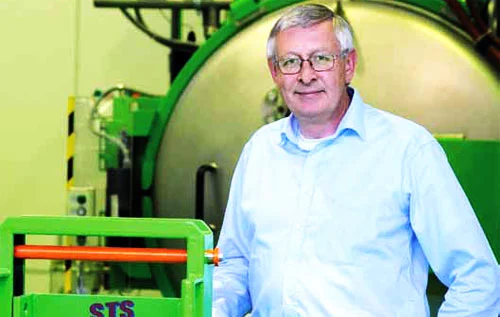“Starry eyed enough”: FMB Feinwerk- und Messtechnik GmbH
Three to four years of hard graft, thought Uwe Schneck, then everything would be running smoothly and he could ease off: In 1990 undoubtedly the greatest miscalculation of his entrepreneurial career. Schneck is a mechanical engineer and one of the managing directors of FMB Feinwerk- und Messtechnik GmbH, a maker of vacuum systems for electron storage rings. Today this company ranks among the world market leaders in the design of vacuum systems and beam lines for IR and soft X-ray generators. For its expansion into hard X-ray technology, FMB in 2007 purchased Oxford Danfysik, originally a division of the industrial giant Oxford Instruments.
“A company can be bought,” explained Uwe Schneck, “but if its people go elsewhere, you can shut up shop.” He was referring to the decision to develop know-how inhouse or to purchase it in the form of a company. Six years previously Oxford Instruments had sold its beam-line division to Danfysik. Despite restructuring, the development there was not progressing as the company had wished. “We though saw initial encouraging indications, recognised the potential and decided to buy.
It was a difficult decision,” recalled Schneck. Also the employees in England had their doubts. “But,” continued Schneck, “we made it clear from the very outset that we want to learn from Oxford, too.” The doubts were soon dispelled, and it became clear to everyone in England that the new people understood what they were doing. Just four weeks after the takeover, the first joint project with FMB Oxford will be implemented for a storage ring in Karlsruhe.
FMB today employs about a hundred personnel at both locations. For many electron storage rings operating with stainless steel vacuum systems all over the world, the company has designed, built and installed beam-lines, so called front ends and vacuum systems. All of this began in the turmoil following German Reunification. Schneck described himself and his twelve colleagues as “starry eyed enough” to venture the step into independence in September 1990 without first waiting for the evaluation of their research centre for scientific instruments. It was all “a rollercoaster ride”, and also Schneck’s wife thought that “nothing will become of it” and recommended looking for a job in West Berlin.
However, the knowhow and high qualifications of the personnel soon scored successes, and the break through came in the form of collaboration projects with the particle accelerator research centres DESY, BESSY, and the Hahn-Meitner Institute, bringing with them knowhow and orders. In 1996 FMB was commissioned to build the vacuum chambers for the electron storage ring BESSY II, a key reference and its ticket to the global arena to Melbourne, Singapore, Canada, Zürich and Barcelona.
The three to four years are long past. “But the hard graft,” admitted Uwe Schneck, “will never cease.”
by Rico Bigelmann
